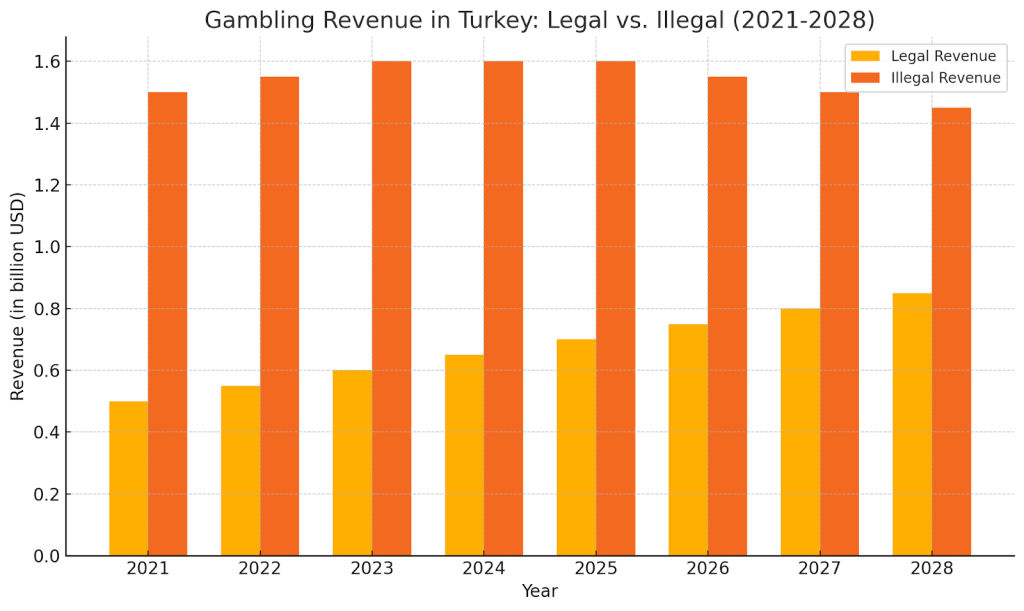Overview Essential Guide to Turkey’s Gambling Laws and Regulations - What You Need to Know
Turkey’s gambling market offers a unique environment for international iGaming operators, marked by strict regulations and a state monopoly on most private gambling options, including online casinos. Despite these limitations, the country presents considerable opportunities due to its large, young, and tech-savvy population of over 85 million, coupled with a significant demand for sports betting.
Historically, Turkey banned casinos in 1998 and most online gambling in 2006, subsequently introducing state-controlled platforms like IDDAA for sports betting. Currently, legal gambling is limited to the national lottery, horse racing, and sports betting via state-approved channels. For private international operators, entering this market necessitates adherence to stringent requirements. These include establishing a local presence, meeting a minimum paid-up capital of TRY 5 million, forming joint ventures with Turkish companies, and complying with robust Anti-Money Laundering (AML) regulations.
The regulatory landscape is decentralised, with various authorities such as the Turkish Sports Toto Organisation and the Jockey Club of Turkey overseeing specific areas. Looking forward, the online gambling sector is projected to experience a Compound Annual Growth Rate (CAGR) of 9% from 2023 to 2028, potentially exceeding US$2 billion. While challenging, early compliance and strategic local partnerships could position operators to benefit from future market evolution, potentially driven by increasing digitalisation and alignment with European standards.
Turkey’s gambling market has its fair share of trade-offs for international iGaming operators. On the one hand, strict regulations mean online casinos and most private gambling options are off the table. But for those willing to play by the rules, a certain stability comes with working in a highly structured environment. Compliant operators can tap into clear guidelines and even explore partnerships with state-backed entities like IDDAA. The nation also has one of the largest populations in Europe, with a growing economy and a strong demand for betting.
However, it’s not an easy path to take. The government holds a tight grip on sports betting, leaving limited room for international brands to compete as they would otherwise in a free market setting. This situation is unlikely to change anytime soon, so entering Turkey’s market means overcoming its unique challenges and acknowledging the risks. In the pages ahead, we examine the risks, potential rewards, and regulatory insights needed to enter Turkey’s tightly controlled gambling sector successfully.
History of Gambling in Turkey
Modern-day gambling in Turkey is deeply rooted in its cultural and social evolution. During the Ottoman period, informal gambling activities were popular among military men and the working class, with dice games and early versions of backgammon mostly played for small wagers. Horse racing, however, became a prominent pastime in the upper echelons of society, with elaborate races held in hippodromes and bets placed by the ruling class and nobility. This early form of sports betting laid the groundwork for today's regulated horse racing industry.
As Turkey moved into the 20th century, card games such as Pisti and Batak (strategic games involving tactical play) gained momentum among locals, especially in coffee houses and on social occasions. These games, though low stakes, contributed to a growing culture of gambling that became part of daily life. The first major regulatory milestone occurred in 1984 with the legalisation of horse racing betting, which provided a structured framework for what had been an informal practice. This was followed by the legalisation of casinos in 1990, sparking a brief yet intense period of growth in the gambling sector.
The casino boom, however, was short-lived. Concerns over social issues and incidents like the assassination of Ömer Lütfü Topal, a prominent figure in the casino industry, led to a government crackdown, culminating in the 1998 ban on all casinos. Consequently, many operations shifted to the Turkish Republic of Northern Cyprus (TRNC) to continue their business under more lenient regulations. Despite this prohibition, the appetite for gambling persisted, leading to the introduction of the state-run betting platform IDDAA in 2004 and subsequent regulation of online betting in 2006.
Timeline of Significant Events in Turkey's Gambling History
1953: Establishment of the Jockey Club of Turkey — Founded to regulate horse racing and betting activities, the Jockey Club laid the groundwork for formalised gambling practices. This marked the beginning of legally sanctioned betting activities.
1984: Legalisation of Horse Race Betting — Horse race betting was officially legalised, providing a regulated platform for gambling activities in Turkey. This legislation was an effort to control betting and curb illegal betting activities.
1990: The passing of the Casino Act 1990 — This led to rapid growth in the gambling industry and a surge of new establishments. However, regulatory oversight was minimal, allowing for widespread money laundering and criminal activities.
1996: Initial Casino Restrictions—Amendments to the Casino Act of 1990. In response to rising crime and corruption, the government imposed restrictions such as limiting operating hours and mandating that winnings be paid by cheque.
1998: Ban on All Casinos — After the assassination of prominent casino operator Ömer Lütfü Topal, a law was enacted (Casino Ban Act of 1996) to close all casinos in Turkey. As a result, many operators moved their businesses to Northern Cyprus.
2004: Launch of the State-Run IDDAA Platform — The government launched IDDAA, a state-controlled sports betting platform, under the Law on the Regulation of Betting and Chance Games. Again, this initiative aimed to curb illegal betting while generating state revenue.
2006: Ban on Online Gambling — The Regulation on Online Gaming was passed, making all forms of online gambling illegal except those operated by the state. This law, effective from 2007, aimed to prevent unlicensed online gambling and control financial outflows.
2013: Stricter Regulations on Online Gambling — Turkey passed the Law on the Regulation of Online Financial Transactions for Gambling, which penalised individual players and financial institutions involved in unlicensed online gambling with fines and imprisonment for offenders.
2017: The Privatisation Act — Authorising the Turkey Wealth Fund to manage and operate games of chance and horse racing bets, consolidating state control over the gambling industry.
2019: Licensing of Sisal-Şans Joint Venture Group — Under the National Lottery and Games of Chance Privatisation Act, the Sisal-Şans Joint Venture Group was granted a 10-year licence to operate games of chance and horse race betting in efforts to modernise the sector.
2023: Enforcement Against Illegal Online Gambling — The Anti-Illegal Gambling Act of 2023 was enacted to enhance efforts against unlicensed online gambling. It included blocking access to foreign gambling sites and prohibiting banks from processing gambling-related transactions.
2024: Continued State Monopoly on Gambling — Despite the challenges, the state maintains a strict monopoly on legal gambling activities through the IDDAA platform and licensed operators. The legal framework continues to impose strict penalties on unlicensed operations and online gambling.
The Current Situation for iGaming in Turkey
Following significant changes to the legal framework in the early 2000s, gambling in Turkey is heavily regulated, with strict limitations on the activities permissible for both citizens and operators. State-controlled betting activities such as the national lottery, horse racing, and sports betting through the state-operated IDDAA are the only legal options. In spite of strict regulations, however, online gambling remains popular among Turkish players, who frequently access international sites. With that said, while the allure of gambling endures among Turkish citizens, the legal framework remains firmly conservative, focusing on controlled, state-managed activities.
However, while heavily regulated, Turkey’s current gambling market still offers opportunities for gambling operators seeking to enter legally. State-controlled sectors, such as sports betting via IDDAA and the national lottery, present a gateway for operators through government-approved collaborations. This allows businesses to engage in a market where consumer demand for legal gambling remains strong.
Despite strict regulations prohibiting online casinos and other forms of private gambling, the structured environment offers stability for compliant operators. Legal entrants benefit from clear guidelines and the potential for strategic partnerships with state entities, providing a platform to offer gambling services in a secure and regulated manner.
Looking ahead, there are indications that the market could evolve. Turkey’s ongoing discussions with the EU and the potential need to align with European standards may lead to reforms that open up the gambling scene further. While no immediate changes are expected, operators who position themselves early, adhere to existing regulations and build strong local partnerships could find themselves well-placed should the market expand.
Essential Requirements for Private International Operators in Turkey
Private sportsbook operators wishing to participate in legal gambling activities in Turkey must adhere to strict rules and regulations by the respective regulatory authorities. Licences relating to sports betting activities are primarily issued by the Turkish Sports Toto Organisation and the Jockey Club of Turkey. Operators face several key requirements, such as establishing a local presence, meeting financial thresholds, and complying with anti-money laundering (AML) regulations. Furthermore, foreign companies may need to form joint ventures with Turkish firms, ensuring compliance with the Turkish Commercial Code. Here are the standard rules that apply to all betting activities:
1. Local Presence Requirement
Operators must establish a local presence by setting up a joint-stock company under the Turkish Commercial Code. This ensures compliance with local business regulations and facilitates easier monitoring and enforcement by Turkish authorities. In addition, establishing a physical office is mandatory to manage daily operations and meet legal requirements.
2. Paid-Up Capital Requirement
To obtain a licence, operators must have a minimum paid-up capital of TRY 5 million (approximately €133,000). This financial threshold demonstrates the operator’s financial stability and ability to manage large-scale operations, ensuring they can support local gambling activities without jeopardising financial security.
3. Joint Venture with Local Companies
Foreign operators are required to form joint ventures with Turkish companies. This collaboration integrates international expertise with local market knowledge, ensuring operators are well-versed in Turkey's unique regulatory and general business environment and practices.
4. Meet Data Localisation Requirement
The Turkish Data Protection Law (DPL) does not explicitly mandate data localisation, but its restrictions on transferring personal data abroad imply such a requirement. Data can only be transferred outside Turkey with explicit consent, legal exceptions, and adequate protection, but no countries are currently designated as offering sufficient protection.
5. Compliance with Anti-Money Laundering Regulations
Local and international operators must adhere to stringent AML requirements outlined in Law No. 5549 on the Prevention of Laundering Proceeds of Crime. This includes implementing strong customer verification processes and reporting suspicious activities to the relevant authorities, thereby ensuring that gambling operations remain transparent and secure.
Gambling Authorities and their Role
Unlike many other gambling jurisdictions, no single authority oversees and regulates all gambling-related activities in Turkey. Instead, several entities work under general government regulations and are individually responsible for their areas, such as lotteries, sports betting, horse racing, and financial compliance. This decentralised structure allows for targeted regulatory oversight. Each of the following institutions operates independently within its specific domain.
Turkish Sports Toto Organisation
Established in 1959, the Turkish Sports Toto Organisation is Turkey's primary authority regulating sports betting. It operates under the Ministry of Youth and Sports and controls all online and offline legal sports betting activities. The organisation issues licences to approved operators, monitors compliance, and ensures that betting practices adhere to national regulations. Furthermore, its role encompasses duties such as working closely with the Ministry of Finance and the Banking Regulation and Supervision Agency to prevent illegal betting activities and maintain financial integrity in the sports betting sector.
The Sports Toto Organisation operates in partnership with Şans Girişim to maintain strict control over legal sports betting operations in Turkey. Şans Girişim is a joint venture that operates fixed-odds and pari-mutuel betting on sporting events on behalf of the Turkish Sports Toto Organisation. It manages the IDDAA brand, Turkey's primary sports betting platform, under a contract with the Ministry of Youth and Sports. Ultimately, Şans Girişim provides sales support to thousands of agents across the country and works with major betting platforms to offer regulated sports betting services.
Turkish National Lottery Administration (Milli Piyango İdaresi)
Founded in 1939, the Turkish National Lottery Administration (Milli Piyango İdaresi) stands as a pillar in Turkey’s regulated gambling sector. Unlike other regulatory bodies, it oversees lotteries and actively designs and manages a diverse array of games, from scratch cards to nationwide draws. Operating under the Ministry of Finance, it ensures legal compliance while influencing public trust through transparent operations. Its role extends beyond regulation; it actively shapes the lottery landscape by creating innovative, legal gaming opportunities that resonate with Turkish citizens.
Jockey Club of Turkey (Türkiye Jokey Kulübü)
The Jockey Club of Turkey (Türkiye Jokey Kulübü) is the central authority regulating horse racing and betting activities throughout the country. Founded in 1950, it was initially formed to organise and manage races. Today, the Jockey Club currently operates under Ordinance No. 6132 and is supervised by the Ministry of Agriculture. This authority regulates and manages everything from licensing racecourses to setting betting rules. It ensures fair play and transparency in horse race betting. On a day-to-day basis, it oversees racecourse licensing, the regulation of breeding practices, and the organisation of betting activities. The club also works closely with international racing bodies and has a significant impact on online gambling operators who engage in horse racing-related betting activities.
Banking Regulation and Supervision Agency (BDDK)
The Banking Regulation and Supervision Agency (BDDK) is the key institution overseeing Turkey’s financial sector and one which plays a significant role in regulating financial activities related to gambling in Turkey. Ultimately, it monitors and controls financial transactions to prevent illegal transfers and ensure compliance with anti-money laundering laws. For sports betting operators, the BDDK enforces strict regulations to ensure that all economic activities are transparent and secure. To effectively conduct its duties, the BDDK collaborates with other regulatory bodies to oversee licensed operators, making it a key player in maintaining integrity within the gambling sector.
Information and Communication Technologies Authority (BTK)
Established in 2000, the Information and Communication Technologies Authority (BTK) regulates Turkey’s telecommunications and internet sectors. It plays a fundamental role in the online gambling industry by enforcing restrictions on illegal gambling websites and monitoring internet activity. In practice, the BTK works closely with other regulatory bodies, such as the National Lottery Administration, to block access to unlicensed gambling platforms. This ensures that only authorised operators can offer their services, impacting the day-to-day operations of both local and international online gambling companies.
Opportunities and Future Outlook
Turkey’s online gambling market is ripe with potential, offering lucrative opportunities for sportsbook operators keen to tap into a population of over 85 million, of which more than 70% are under 50 and tech-savvy. The country's enthusiasm for sports, especially football and basketball, makes it a prime destination for sports betting. In fact, the online gambling sector in Turkey is projected to grow at a compound annual growth rate (CAGR) of 9% from 2023 to 2028, potentially reaching over US$ 2 billion by 2028.

The regulatory environment, while strict, provides a structured framework that favours those who are compliant. Operators who can navigate these regulations and establish local partnerships will find themselves well-positioned to benefit from a rapidly growing market. Legal expert Alican Babalioglu from CMS tax law further observes: "As Turkey moves towards greater digitalisation, the iGaming sector is poised for a transformative period, offering substantial rewards for early investors.”
“Turkey’s growing young population and increasing digital engagement make it a promising frontier for iGaming operators,” says another commentator from the gaming research community. Moreover, ongoing technological advancements and the rising penetration of mobile internet usage are expected to drive the expansion of online gambling further. Although barriers such as licensing restrictions and stringent financial regulations exist, they also serve to create a stable and secure environment for licensed operators, discouraging unregulated competition.
Future reforms, particularly in alignment with potential European Union regulations, could further liberalise the market, making Turkey an even more attractive prospect for international operators. Those who invest early in compliance and local market understanding stand to gain significantly as the market evolves.
Market Advantages
-
Large population with a strong enthusiasm for sports betting.
-
Rising internet penetration and increasing smartphone usage.
-
A young, tech-savvy market eager to explore online betting.
-
A regulatory environment offering stability for licensed operators.
-
Passion for sports like football and basketball, driving demand.
-
Market shifting from illegal to legal gambling activities.
Market Disadvantages
-
Restrictions on casino games and poker limit diversity.
-
Economic and political uncertainty may impact market conditions.
Break New Ground in Turkey
For international operators wishing to enter the market, compliance with the existing legal structure not only helps avoid penalties but also builds a foundation for future opportunities. While the ongoing tension between liberalisation and restriction makes it a more challenging environment for operators, the rewards for those who successfully align with Turkey’s current regulatory environment could be significant.
Don’t miss your chance to lead. Early movers have the edge, and the window is still open. Our proven technology and market insights can help you flourish in Turkey’s regulated environment. Reach out to Altenar today to learn how we can support your entry with tailored solutions that ensure you prosper.
Disclaimer
This information is not intended to be legal advice and is solely extracted from open sources. It should not be relied upon as a substitute for professional legal advice and Altenar does not accept any liability in relation to its use.













